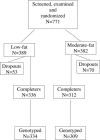Genetic polymorphisms and weight loss in obesity: a randomised trial of hypo-energetic high- versus low-fat diets
- PMID: 16871334
- PMCID: PMC1488899
- DOI: 10.1371/journal.pctr.0010012
Genetic polymorphisms and weight loss in obesity: a randomised trial of hypo-energetic high- versus low-fat diets
Abstract
Objectives: To study if genes with common single nucleotide polymorphisms (SNPs) associated with obesity-related phenotypes influence weight loss (WL) in obese individuals treated by a hypo-energetic low-fat or high-fat diet.
Design: Randomised, parallel, two-arm, open-label multi-centre trial.
Setting: Eight clinical centres in seven European countries.
Participants: 771 obese adult individuals.
Interventions: 10-wk dietary intervention to hypo-energetic (-600 kcal/d) diets with a targeted fat energy of 20%-25% or 40%-45%, completed in 648 participants.
Outcome measures: WL during the 10 wk in relation to genotypes of 42 SNPs in 26 candidate genes, probably associated with hypothalamic regulation of appetite, efficiency of energy expenditure, regulation of adipocyte differentiation and function, lipid and glucose metabolism, or production of adipocytokines, determined in 642 participants.
Results: Compared with the noncarriers of each of the SNPs, and after adjusting for gender, age, baseline weight and centre, heterozygotes showed WL differences that ranged from -0.6 to 0.8 kg, and homozygotes, from -0.7 to 3.1 kg. Genotype-dependent additional WL on low-fat diet ranged from 1.9 to -1.6 kg in heterozygotes, and from 3.8 kg to -2.1 kg in homozygotes relative to the noncarriers. Considering the multiple testing conducted, none of the associations was statistically significant.
Conclusions: Polymorphisms in a panel of obesity-related candidate genes play a minor role, if any, in modulating weight changes induced by a moderate hypo-energetic low-fat or high-fat diet.
Conflict of interest statement
References
-
- Maes HH, Neale MC, Eaves LJ. Genetic and environmental factors in relative body weight and human adiposity. Behav Genet. 1997;27:325–351. - PubMed
-
- Bell CG, Walley AJ, Froguel P. The genetics of human obesity. Nat Rev Genet. 2005;6:221–234. - PubMed
-
- Verdich C, Clement K, Sørensen T. Nutrient-gene interactions in the control of obesity. In Remacle C, Reusens B, eds. Functional foods, ageing and degenerative disease. Cambridge: Woodhead Publishing Ltd; 2004. pp. 223–259.
-
- Perusse L, Rankinen T, Zuberi A, Chagnon YC, Weisnagel SJ, et al. The human obesity gene map: the 2004 update. Obes Res. 2005;13:381–490. - PubMed
-
- Viguerie N, Vidal H, Arner P, Holst C, Verdich C, et al. Adipose tissue gene expression in obese subjects during low-fat and high-fat hypocaloric diets. Diabetologia. 2005;48:123–131. - PubMed
Grants and funding
LinkOut - more resources
Full Text Sources
Other Literature Sources


